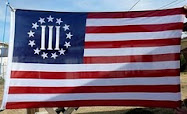by Wendy McElroy
Tuesday 16 December 2008
http://www.wendymcelroy.com/news.php?extend.2148
What would you do if martial law were declared in the United States? After all, martial law is not a new concept nor a new reality to America. It was declared in 1794 during the Whiskey Rebellion, in 1882 during the Civil War, in Hawaii during World War II, and in NYC after 9/11. Many analysts have commented on how the Bush administration has paved the way for Presidents to declare martial law in the future. .
IntelDaily stated,
If martial law is declared, your civil rights will no longer be recognized by the authorities; basic rights -- such as due process -- will no longer exist. How can you protect yourself...right now and afterward?
[Note: I am indebted to Jarret B. Wollsteins' "Surviving Terrorism" for the following suggestions upon which I have expanded; I highly recommend his book for your shelf.]
1. Seek out reliable alternative sources of news. The mainstream media will be worse than useless in giving you a sense of what is really happening politically. Without such a sense, you will not be able to make an educated guess about what is likely to happen next.
2. Avoid high-surveillance areas with a high police/military presence like airports or checkpoints. The authorities are there in strength to ferret out wrong-doers. If you make a bad joke, show up in a database or just seem too nervous, then you can be detained, questioned and/or arrested. Remember: there will be no due process.
3. Do not visit controversial sites on the Internet. Do not buy controversial books or material with a credit card. Do not check them out of a library. Do not read them in public places. Do not discuss them in casual conversations or ones that are likely to be overheard. Do not wear T-shirts with political slogans or controversial sentiments.
4. Be careful about the information you disclose to anyone in a position of power (e.g. your doctor) or to strangers. Indeed, be careful with anyone whose decency and discretion you do not trust. Remember that even your doctor may have a legal obligation to 'turn you in' should you confess to 'crimes', such considering suicide or owning a gun. Train your children to show a similar discretion and to never discuss what goes on in your home, especially with strangers or authority figures like their public school teachers. Make sure your partner understands and agrees with you about the need for privacy.
5. If you can, find 'authorities' you can trust, especially a lawyer.
6. Encrypt sensitive and/or valuable computer files and keep a back-up copy off-site -- that is, somewhere other than your home or office. Don't keep a record of where the back-ups are secured.
7. Own a gun and keep a healthy supply of cash on hand. Tell no one.
8. Support organizations and people who are fighting openly to push society in the opposition direction from martial law. It may not be appropriate for you to take that risk but do encourage those who are.
























